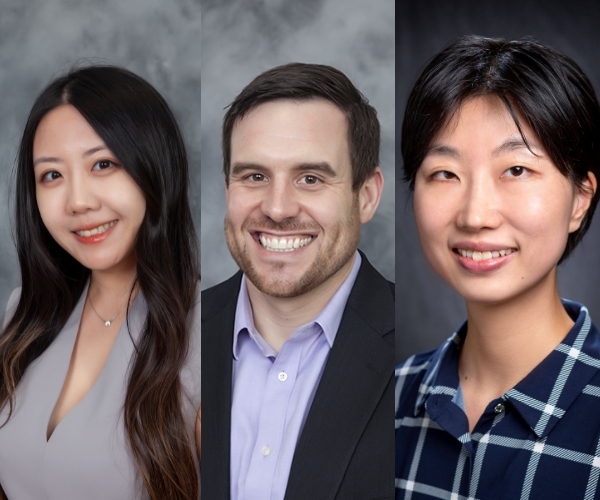LSU School of Kinesiology Research Team Receives $100K Provost’s Fund for Innovation in Research Grant
April 01, 2025
BATON ROUGE, LA — A 2020 study involving more than 11,000 autistic children found that nearly 87% of the participants
were at risk for motor difficulties, but only 32% of those children were receiving
some sort of physical therapy intervention to improve their motor skills. Therefore,
a vast majority of the participants may enter adolescence with clinically significant
motor difficulties, making going to school and playing with other children even more
difficult. An LSU interdisciplinary research team, with the help from a $100K seed
grant, is making strides to study and create a solution for this all-too-common occurrence
for autistic children. 
Researchers Wan-Chun Su, PhD; Nicholas Fears, PhD; and Hyun Kim, PhD, professors in the LSU School of Kinesiology, along with Jason Jamerson, MFA, from the College of Art & Design and College of Music & Dramatic Arts, are developing a virtual reality classroom to study how human walking patterns and brain activity are impacted when moving around other people and obstacles.
“Across our research and engagement with autistic individuals, motor difficulties are consistently one of the primary issues that autistic individuals identify as affecting their quality of life,” said Fears, assistant professor and lab director of the Human Development & Daily Life (HuDDL) Lab in the LSU School of Kinesiology. “They often mention being covered in bruises from bumping into furniture or tripping over obstacles which leads them to avoid participating in some activities. Identifying why autistic individuals have these motor difficulties will provide us with the data we need to support them.”
This pilot study, funded by a $100,000 grant from the LSU Provost’s Fund for Innovation in Research, will feature a 180-degree wraparound immersive virtual environment screen and a force-sensing treadmill that allow participants to walk while navigating the virtual classroom with different scenarios such as desk arrangements and social obstacles. Combining virtual reality, force-sensing treadmill, motion tracking, and functional Near-Infrared Spectroscopy (fNIRS) to capture neural activity and lower limb kinematics during navigation, Su, Fears, Kim, and Jamerson will decipher how the brain and body adapt under these conditions.
“Despite growing awareness of motor difficulties in autistic individuals, their impact on social interactions remains poorly understood,” said Su, the team lead for this project. “This project is a crucial first step in using virtual reality, motion tracking, and brain imaging to study social motor skills in a naturalistic setting. The insights gained will not only help identify individuals with social motor challenges and inform intervention strategies but also open the door for future research using similar advanced setups to further explore social motor development.”
This study will provide a better understanding of social motor skills and valuable insights into identifying social motor challenges. The researchers are aiming to include autistic children in further iterations of this study.
“By integrating virtual reality, motion tracking, and neural activity measurements, this study will help us better understand how autistic individuals navigate physical spaces and the specific challenges they encounter,” said Kim. “Our findings could contribute to developing targeted interventions that enhance both mobility and confidence in social settings.”
The end goal for Su, Fears, Kim, and Jamerson is to help guide the development of training programs aimed at improving safe navigation in social environments, particularly for individuals with social motor difficulties.
“The work of our recently hired faculty members in the School of Kinesiology is truly outstanding,” John Nauright, PhD, LSU School of Kinesiology Director, said. “We have built an outstanding team that wins, evidenced by the success of faculty members such as Hyun Kim, Nick Fears, Wan-Chun Su and their colleagues! We are rapidly becoming one of the leading national and global universities researching in biomechanics and motor development particularly in the area of autism, and this award recognizes that.”
About the LSU School of Kinesiology
The LSU School of Kinesiology (SOK) advances the understanding of physical activity,
sport, and health to optimize the quality of life for diverse populations through
excellence in teaching, learning, discovery, and engagement. SOK offers a BS, MS,
Online MS, PhD, and two certificate options. Graduates go on to successful careers
in the health and fitness industry, corporate wellness, sport agencies and businesses,
athletic administration, and K-12 educational settings. SOK is part of the College
of Human Sciences & Education.
Visit the School of Kinesiology website.
About the College of Human Sciences & Education
The College of Human Sciences & Education (CHSE) is a nationally accredited division
of Louisiana State University. The college is comprised of the School of Education,
the School of Information Studies, the School of Kinesiology, the School of Leadership
& Human Resource Development, and the School of Social Work. CHSE has two model demonstration
schools, the Early Childhood Education Laboratory Preschool, enrolling birth to age
four and the University Laboratory School enrolling Kindergarten through grade 12.
The college also has four centers and institutes: the Early Childhood Education Institute,
the Healthy Aging Research Center, the Leadership Development Institute, and Social
Research & Evaluation Center. The college is committed to achieving the highest standards
in teaching, research, and service and aims to improve quality of life across the
lifespan.
Visit the College of Human Sciences & Education website.